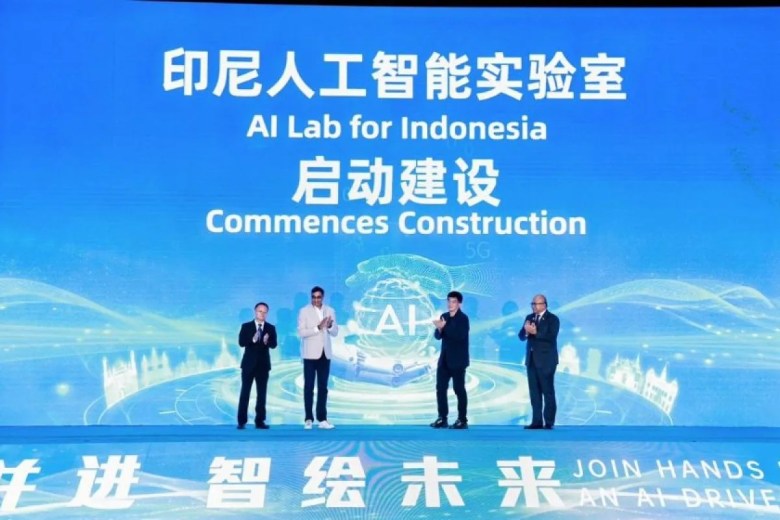Politics
Indonesia Expands AI Horizons with Tsinghua University Partnership

Indonesia is advancing its artificial intelligence (AI) ambitions through a strategic partnership with Tsinghua University, along with Indosat Ooredoo Hutchison and the Indonesia Technology Alliance. This collaboration aims to establish an AI Application Cooperation Center, designed to enhance the local AI ecosystem, cultivate homegrown talent, and connect Indonesia with one of China’s most esteemed research institutions. Rather than choosing sides in the ongoing rivalry between the United States and China, Jakarta is focusing on building diverse pathways in AI development.
The partnership with Tsinghua is indicative of Indonesia’s growing network of collaborations with Chinese entities. Earlier this year, Indonesian officials engaged with their counterparts in Nanning, located in Guangxi province, to explore the integration of AI in smart city initiatives, agriculture, and fisheries. During these discussions, Beijing committed to support AI-enabled devices and training programs, proposing industrial “AI-plus” platforms aimed at linking China with the ASEAN markets.
In August 2025, another significant collaboration took place when Malaysia-based Zetrix AI teamed up with Indonesia’s PT Royal Solusi Investasi to establish an ASEAN-China AI Lab in Jakarta. This lab focuses on localizing generative AI, robotics, and blockchain technologies. In comparison to these previous initiatives, the Tsinghua hub stands out as a dedicated research center, emphasizing applied AI research and the development of local talent pipelines.
China’s involvement in Indonesia’s AI sector complements existing international partnerships. Microsoft has pledged US$1.7 billion to enhance cloud and AI infrastructure in the region, while Nvidia has committed $200 million to an AI center in collaboration with Indosat. Additionally, South Korea’s LG is in the process of constructing a $72 million data center in Indonesia. By engaging multiple partners from the US, South Korea, and now China, Indonesia is diversifying its AI ecosystem, thereby ensuring access to a broader array of technologies, investments, and research capacities.
This multifaceted approach is rooted in pragmatism. Indonesia recognizes that it cannot compete head-to-head with the technological giants of the US or China in developing AI infrastructure from scratch. Like many nations, it will depend on foreign AI architectures. However, Indonesia can strategically choose its partners, ensuring that its workforce, public institutions, and startups are exposed to a variety of technologies and operational methods.
The Tsinghua lab is expected to play a crucial role in this strategy. By training Indonesian talent alongside researchers from Tsinghua, the country aims to retain expertise domestically and bolster its capacity for applied AI. Although the initial outputs may be modest, the collaborative experiences are anticipated to have a cascading effect, benefiting startups, public institutions, and innovation networks in the region. Over time, it is hoped that a new generation of researchers and engineers trained in such environments will form the backbone of Indonesia’s AI workforce.
Concerns regarding potential Chinese influence are often exaggerated. AI technologies exported to other nations do not carry the same political filters that may be present within China. Indonesians are already utilizing platforms such as TikTok and Temu without direct oversight from Beijing. The real challenges lie domestically, including inconsistent internet access outside urban areas, limited startup funding, and evolving data protection and cybersecurity regulations.
In this landscape, China’s participation is seen as a complementary force that enhances Indonesia’s AI aspirations rather than constraining them. The growing presence of China provides a necessary counterbalance in a field traditionally dominated by American firms. While the US remains a leader in chips, cloud services, and AI platforms, China’s expertise offers valuable research collaboration and training opportunities.
By fostering multiple partnerships, Jakarta positions itself to capitalize on competition, attracting investment, skills, and infrastructure from various sources. Indonesia’s strategy in AI is not about choosing sides in the rivalry between superpowers; instead, it is about diversification. This ensures that the nation remains an active participant in the global AI ecosystem rather than a passive consumer.
The partnership with Tsinghua University may not fundamentally alter the global AI landscape, but it does enhance Jakarta’s portfolio by integrating Chinese knowledge, talent, and research into a broader strategy that includes cooperation with US and Korean partners. In a world increasingly influenced by American and Chinese technology giants, Indonesia cannot dictate the rules. Yet, by diversifying its AI partnerships, it can forge a path that aligns with its national interests, promotes skill development, and fosters long-term technological resilience.
Muhammad Zulfikar Rakhmat, director of the China-Indonesia Desk at the Jakarta-based Center for Economic and Law Studies (CELIOS), emphasizes that the establishment of the Tsinghua lab signals Jakarta’s awareness of the stakes involved. In the evolving global AI landscape, the most effective strategy may very well be to multiply partnerships rather than to take sides.
-

 World5 months ago
World5 months agoSouth Korea’s Foreign Minister Cho Hyun to Visit China This Week
-

 Business5 months ago
Business5 months agoStarling Bank Plans Secondary Share Sale, Targeting $5.4 Billion Valuation
-

 Top Stories5 months ago
Top Stories5 months agoMunsang College Celebrates 100 Years with Grand Ceremony
-

 World5 months ago
World5 months agoPAS Aims to Expand Parliamentary Influence in Upcoming Election
-

 Business7 months ago
Business7 months agoKenvue Dismisses CEO Thibaut Mongon as Strategic Review Advances
-

 Lifestyle6 months ago
Lifestyle6 months agoHumanism Camp Engages 250 Youths in Summer Fest 2025
-

 Sports6 months ago
Sports6 months agoDe Minaur Triumphs at Washington Open After Thrilling Comeback
-

 Sports7 months ago
Sports7 months agoTupou and Daugunu Join First Nations Squad for Lions Clash
-

 Top Stories7 months ago
Top Stories7 months agoColombian Senator Miguel Uribe Shows Signs of Recovery After Attack
-

 World7 months ago
World7 months agoASEAN Gears Up for Historic Joint Meeting of Foreign and Economic Ministers
-

 Health6 months ago
Health6 months agoNew Study Challenges Assumptions About Aging and Inflammation
-

 Business7 months ago
Business7 months agoOil Prices Surge Following New EU Sanctions on Russia









